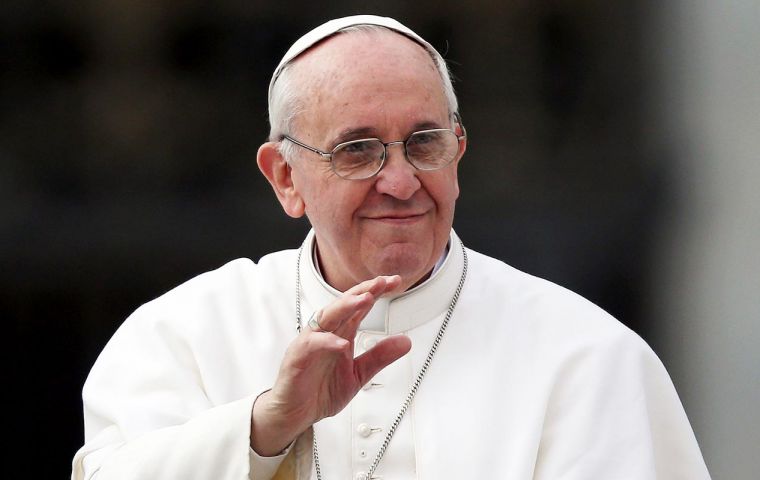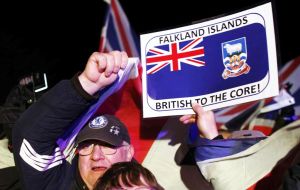MercoPress. South Atlantic News Agency
Pope Francis and the Malvinas
 Francis’s generosity of word and openness has also made him an easy target for those who want to try and use his global popularity to push a particular cause
Francis’s generosity of word and openness has also made him an easy target for those who want to try and use his global popularity to push a particular cause  The latest example of this is a photograph of Francis holding a small poster urging the UK to enter a dialogue with Argentina over the Malvinas
The latest example of this is a photograph of Francis holding a small poster urging the UK to enter a dialogue with Argentina over the Malvinas  The Falklanders have not indicated any desire for change: indeed they voted in 2013 by 99.8% to remain British.
The Falklanders have not indicated any desire for change: indeed they voted in 2013 by 99.8% to remain British.  Few doubt Cristina Fernandez personal reconciliation, but when Buenos Aires Archbishop, Nestor Kirchner considered him ‘the leader of the opposition”.
Few doubt Cristina Fernandez personal reconciliation, but when Buenos Aires Archbishop, Nestor Kirchner considered him ‘the leader of the opposition”. By Jimmy Burns - The snapped moment of encounter projected fast and globally on the world wide web has become as much as a characteristic of the Francis papacy, as his twitter account @pontifex. This is a papacy with a charismatic personality and instinctive communicator at its helm. It is also a papacy advised by media specialists and diplomats that know something about the opportunity offered by the digital age to spread a message with an impact that would have inconceivable just a few years ago.
Since Francis’s election, there have been examples of this communications strategy being used to underline the Pope’s humility and the humanity of the gospel message, from washing the feet of Muslim women (not turning them into slaves) to gently kissing and blessing children (not abusing them).
And yet while the transparency of Francis’s generosity of word and openness to the world is one of the great gifts of his papacy, it has also made him an easy target for those who want to try and use his global popularity to push a particular cause , and have him take sides.
The latest example of this is a photograph taken at this week’s general papal audience in St Peter’s Square, widely published in the Spanish language media, of Francis holding a small poster urging the United Kingdom to enter a dialogue with Argentina over the Malvinas, as the Pope’s fellow countrymen and women call the Falklands, the UK governed Islands in the South Atlantic.
Behind the apparent gesture of reconciliation between two countries that waged war over the Islands back in 1982, following an invasion by the Argentina military junta, lies a determined diplomatic campaign by the government of Cristina Fernandez Kirchner to have the UK discuss the issue of sovereignty over the islands, with a view to handing them over to Buenos Aires- something which successive British governments have refused to do.
The UK’s bases its position on its continuous administration of the Islands since 1833 (except for three months of Argentine military occupation in 1982 ) and the islanders’ right to self-determination as set out in the UN Charter. The Falklanders have not indicated a desire for change-indeed they voted in 2013 by 99.8% to remain British.
Argentine policy maintains that Falkland Islanders do not have a right to self-determination as British subjects because Argentina acquired the Malvinas from Spain in 1816 only to have their authorities expelled by military force by the British in 1833.
While Pope Francis as an Argentine was brought up believing that sovereignty over the Malvinas belongs to his native country, this an issue he has thus far avoided becoming directly embroiled in. Las Malvinas son Argentinas were drummed into Bergoglio when he was a young boy, but today this is a disputed claim not just by the UK but within the UN, and whatever love the Islanders might have felt for Argentina at any point was literally shot to pieces by the military invasion of 1982 and the less than exemplary nature of Argentine democracy ever since.
Moreover while the Argentine claim under the military regime led to war, the present British rule of the Islands represents neither any internal repression of the inhabitants nor a threat to world peace since neither side is threatening each other with another military conflict. True enough the Vatican in late 1970’s mediated successfully in the disputed Beagle Channel, but that was when two nominally Catholic countries-Chile and Argentina- were on the brink of war.
The more recent case of the restoration of Cuba-US relations does not involve any issue of disputed sovereignty but has been the result of the Vatican facilitating dialogue between two nations that for political and commercial reasons had decided to take their relations out of the cold. Their dispute moreover has destabilised diplomatic relations more widely and at one point threatened all out nuclear war.
Certainly Pope Francis has taken an active personal involvement in the world’s messy ‘realities’ (a favourite Bergoglio word), but he has thus far tread carefully not to allow his papacy to become part of the Argentine propaganda machinery- and he has been wise to do so.
It is hard to see how any change to the sovereign status of the Falklands Islands-however downtrodden its ‘colonised’ people and threat of the UK military base the spin doctors of Buenos Aires would have the world believe- should be a priority for a papacy that has defined the focus of its diplomacy as achieving peace, ending poverty, respecting the human dignity of people, and protecting the planet.
Moreover from the moment he stepped out for the first time onto the balcony in St Peter’s Square to utter his words as Pope, Francis knew that his office carried a responsibility that went beyond narrow national interests. While he was set to draw on his Latin American experience, his election as Pope challenged him also to face up to his role of teacher, prophet and teacher and, as a truly global spiritual leader, to transcend his own race and nationality.
And yet no head of state has visited the Vatican since Francis’s election as many times as President Cristina Fernandez. Few doubt her personal reconciliation with someone who when Archbishop of Buenos Aires her late husband and former president Nestor considered ‘leader of the opposition”.
Until last Wednesday, the British government, I understand had been reassured privately by the Vatican that it would not allow itself to be used by Buenos Aires over the Falklands/Malvinas. But one photograph has threatened such an assumption.




Top Comments
Disclaimer & comment rules-

-

-

Read all commentsDon't worry Francis, i'm not sure that the catholic church could be held in a lower esteem by the British people than it already is.
Aug 24th, 2015 - 09:43 am 0If anything, this stunt has actually set back Argentina and not done it any favours.
Aug 24th, 2015 - 10:24 am 0The only fact remains the Pope did send a message. And nobody can ever think he is not aware of what he says, does and holds in public. I still can't believe how UK and its settlers in the islands can be so offended by a call for dialogue in as peaceful terms as the UN has been calling for the last 50 years.
Aug 24th, 2015 - 10:30 am 0Commenting for this story is now closed.
If you have a Facebook account, become a fan and comment on our Facebook Page!